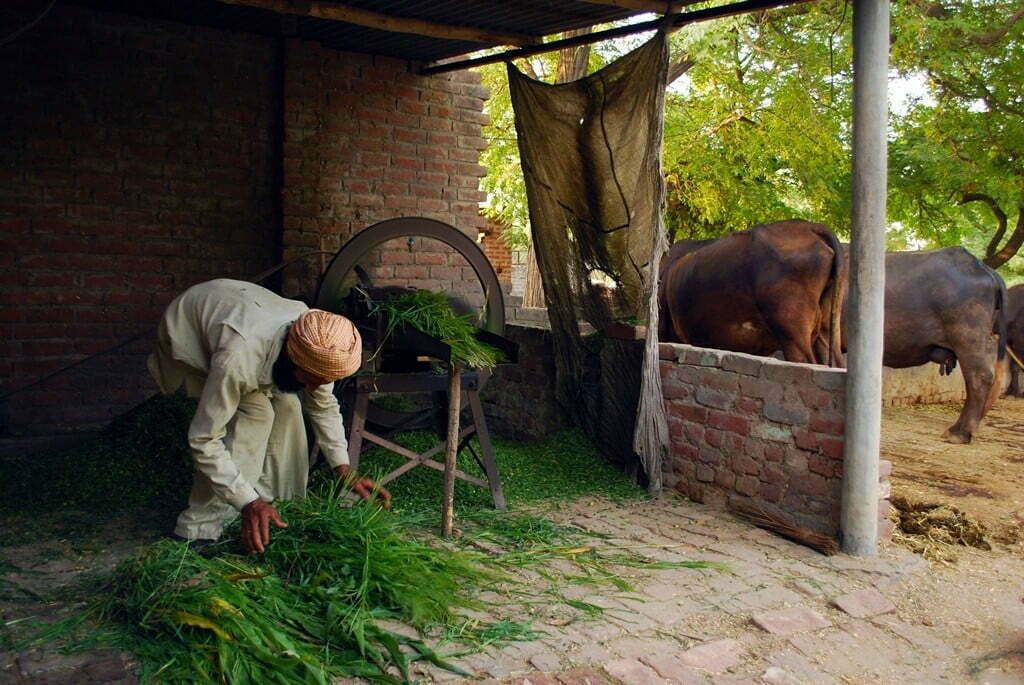
Farmers are simple and an oppressed lot– since the time mankind learnt to harvest the land and forest. Barter system began to fulfil the need within the same settlement. Came the middleman who bartered things from one village to another and got his share for the job. Thus, began the era of “Commission Agent/Broker”. It is difficult, if not impossible, to have direct dealing between the producer and the final consumer. Intermediaries grease the wheels of commerce.
I shall be discussing the newly introduced three farm laws and thereafter. It is easier to dissect in the hindsight. But by discussing this point, maybe, we can learn to avoid such malaise in future. Current on-going Farmers’ Protest has hurt the economy, inconvenienced the citizens, and tarnished the image of the country in the international arena.
There have been large and violent agitations in France in Nov 2019 where thousands of tractors marched into Paris. On 27 Apr 2010, tractors on the France roads had slogan painted, “Carla, help us. We can’t live on love and water”. (Carla Bruni was the wife of the President of France, Nicholas Sarkozy.) It has been happening in Germany, Netherland, Denmark, and Ireland. Our own Farmers agitation in 1988 led by Mahendra Singh Tikait with tractors and bullock carts moving into the capital and camping in Boat Club right next to the Parliament during the Rajiv Gandhi government in 1988 set precedence for large scale farmers’ protest in our country.
What led to the Agitation?
Farmers have been demanding from time to time to improve their income. Present Government in 2016 promised to double the farm income in six years. All previous governments had also been promising to improve farm income. National Commission on Farmers was constituted in Nov 2004 under the Chairmanship of Prof MS Swaminathan. The fifth and final report was presented to the Government in Oct 2006. The reports contain the suggestions to achieve the goal of “faster and more inclusive growth” which is also known as Swaminathan Report for farmers. The government of the day tried to bring-in the suggested reform and “Opposition Political Parties” opposed it. Opposition parties of the time brought the reforms, now the opposition parties which were then in power, opposed it.
The 3 Agriculture Bills: The followings are the three agriculture bills (in brief): –
- The Farmers Produce Trade and Commerce (Promotion and Facilitation) Act 2020, which provides farmers to sell their produce any place without restriction.
- Farmers (Empowerment and Protection) Agreement on and Price assurance and Farm Services Act, 2020. This allows farmers to enter into contract farming and dispute resolution mechanism if any.
- Essential Commodities (Amendment) Act, 2020, Removes stock-holding limit of any commodity.
All three bills present doubt in the minds of farmers that trade area transaction, contract farming and storage have been unregulated and the large business houses will exploit the farmers.
The three Agriculture bills were first promulgated as an Ordinance in Jun 2020. They were presented and passed by the Lok Sabha (Lower House of the Parliament) on 17 Sep 2020 by voice votes (the ruling party has a majority). And the same was passed by the Rajya Sabha (Higher House of the Parliament) on 20 Sep 2020. The passing of the bill in Rajya Sabha has been considered controversial by many as the debate on the bill was not allowed and it was again passed by a voice vote. It must be noted that Smt Harsimran Kaur Badal, from Shiromani Akali Dal, a long-time ally of the BJP, resigned from the cabinet to protest the passing of the bill in Lok Sabha and subsequently Akali Dal left the NDA. Protest of farmers began in Amritsar.

Farmers Protest
Farmers protest had begun in Jun 2020 when a small farmers group protested after the Ordinance was passed. From Sep 2020 the protest escalated to “Rail Roko” in parts of Punjab and Punjab Bandh.
The Union Government failed to judge the emotions and sentiments of the farmers against the laws and paid little attention to allay the fear of the farmers or agree to have a re-look in the contentious issues of the law.
The farm union leaders began to gather more support from other states as well. Punjab farmers gave a call to “Dilli Chalo” and in Nov they began the march on tractors. Haryana farmers joined. They ultimately reached in the borders of Delhi where they were stopped, and they camped on the highways. Main three entry points became the centre of their agitation – Singhu, Ghazipur and Tikri border.
Talks, Talks and Talks
Secretary Agriculture began talks with the leaders of the farmers union which did not achieve any solution. Both sides were adamant: farmers demanding the repeal of the three laws and legislation on MSP (Minimum Support Price) and the Government insisted that the laws were good for the farmers. The farm union leaders refused to talk to the Secretary of the government and demanded to talk to the Prime Minister.
Agriculture Minister, Narendra Singh Tomar and Commerce Minister, Piyush Goyal conducted talks with the farmers. But even after eleven rounds of talks, no solution emerged and impasse continues.
Handling of Issues by the Government
Margaret Thatcher when asked how she successfully implemented various reforms in the country? She replied that she spends 20 per cent of the time in office and 80 per cent of the time is spent on selling the reform before and after the legislation. Unfortunately, our government machinery has failed in selling the reforms it has legislated. Bureaucrats have failed to assess the implication and reaction to such reform – be it demonetization, removal Article 370 & 35A, legislation on CAA, sudden lock-down or present farms laws.
A top-down policy, uninformed by bottom-up realities, is unlikely to transform the livelihoods of small farmers in an oligopolistic environment of agribusiness. A large number of countries implemented Agri-reforms in the seventies and eighties.
A study carried out by the London School of Economics to assess the effects of such reforms was done by Ms Swati Dhingra and Silvana Tenreyro and concluded, “The rise of agribusiness brings productivity gains to the farmers, but it also skews the distribution of buyers of farm produce towards larger firms with greater buying power. Taking the theory to data, we quantify behind-the-border to trade embedded in a national policy which encouraged agribusiness participation. We combine this micro-data on household-crop incomes and find that the policy led to a reduction in incomes of small farmers. Losses were concentrated among farmers who sold to agribusinesses and in villages with a comparative advantage in policy-affected crops. On average, their income fell by 6 per cent with no offsetting gains in non-farm channels of income. Profit margins of agribusinesses specialised in policy-affected crops rose, in line with the theoretical channel”
Experience of Bihar
Bihar government had liberalized its agriculture marketing sector in 2006 when Nitish Kumar became the Chief Minister. But the experiment did not work as planned. It was assumed that the reforms or removal of the APMC (Agriculture Produce Marketing Committee) will enhance the income of farmers by allowing them to free market access and would attract private investment in setting-up cold storage and warehouses which would help farmers. But on the ground, it did not work.
Prof Sanjib Pohit of NCAER (Nation Council of Applied Economic Research), states that not only did prices of farm produce crash but unregulated middlemen and traders forced farmers to pay for their crops to be offloaded and sold at their managed price. Initially, it did show a rise in the farmer’s income from 2006 to 2010. But the income has been declining thereafter.
Failure of the Government
The Government has taken for granted that whatever it does will be implemented automatically. It does not seem to have made any preparation for the implementation of the policy change it wanted to bring-in – be it demonetization, legislation on 370, 35A or CAA, sudden lock-down and the three farm laws.
The Government needs to sell its policies before and after the announcement which began after the situation slipped out of hand. Brute majority in the legislature can have the legislation on the papers but the acceptance and implementation can be a herculean task.
The Government needs to have its ears on the ground and have far and wide consultations. Just to quote, a farmer leader, Anne-Cecile of France told during the Farmers protest in Nov 2019, that she had enough of agri-bashing from both sides (Government and farmers). She said “I believe that both sides should try to be less arrogant. There are fewer and fewer farmers in France. Therefore, it is important to make the effort to resume dialogue. Everyone has to understand farming is an overly complex occupation subject to enormous prejudices, and before judging it, you should go to the farm and see for yourself how things are done.” That is true for India too where farmers are quitting due to farming being less enumerative.
Conclusion
The three contentious agri-laws have been proposed to be put under suspended animation for 18 months by the government. It is time for the farmer unions to take advantage of the opportunity and suspend their agitation as well and give space for discussion, amendments, and implementation. There is a crying need for reforms in the farm sector. But amendments must be such to bring in the real income in the pockets of the farmers.
Every state in the country has an Agriculture University to cater to the state keeping in mind the climate, soil, and water availability. The Government should constitute a high-power committee, other than the one ordered by the Supreme Court, with members from each of such universities, have a wide range of discussion with agriculture economists and farmers representative. This process should evolve a consensus among all stakeholders and such reforms should be legislated.

